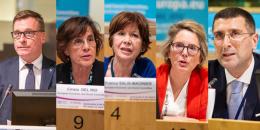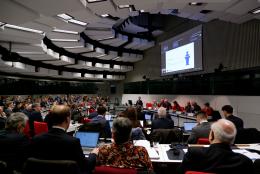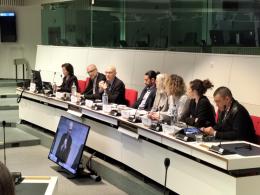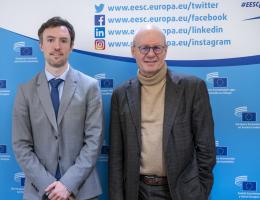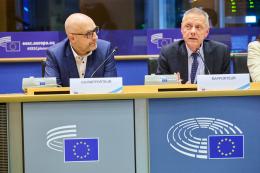European Economic
and Social Committee
Main navigation
-
Om EØSU
ABOUT
The European Economic and Social Committee (EESC) is the voice of organised civil society in Europe.
Find out more about its role and structure at http://www.eesc.europa.eu/en/about
- Politisk struktur
- Forvaltningsstruktur
- SAMARBEJDE MED ANDRE INSTITUTIONER
- Rules
-
Vores arbejde
OUR WORK
The EESC issues between 160 and 190 opinions and information reports a year.
It also organises several annual initiatives and events with a focus on civil society and citizens’ participation such as the Civil Society Prize, the Civil Society Days, the Your Europe, Your Say youth plenary and the ECI Day.
Find the latest EESC opinions and publications at http://www.eesc.europa.eu/en/our-work/opinions-information-reports/opinions and http://www.eesc.europa.eu/en/our-work/publications-other-work/publications respectively.
- Udtalelser og informationsrapporter
- Dokumenter
- Publikationer og andet arbejde
-
Civilsamfundet og borgernes deltagelse
- Civil Society Week
- European elections 2024
- Civilsamfundsprisen
- The Conference on the Future of Europe
- Europæisk demokratipas
- Dit Europa, din mening!
- Det europæiske borgerinitiativ (ECI)
- The path to our industrial future
- Youth Climate and Sustainability Round Tables
- EU Organic Awards
- Civil Society Against COVID 19
- EESC stands with Ukraine
- Partnerships
- Relations with ESCs
-
Politikker
POLICIES
The EESC is active in a wide range of areas, from social affairs to economy, energy and sustainability.
Learn more about our policy areas and policy highlights at http://www.eesc.europa.eu/en/policies
-
Politikområder
- Landbrug, udvikling af landdistrikterne og fiskeri
- Klimaindsatsen
- Samhørighed, regional- og bypolitik
- Forbrugere
- Digitale ændringer og informationssamfundet
- Den Økonomiske og Monetære Union
- Uddannelse og erhvervsuddannelse
- Beskæftigelse
- Energi
- Erhvervspolitik
- Miljø
- Eksterne forbindelser
- Finansielle tjenesteydelser og kapitalmarkeder
- Grundlæggende og borgerlige rettigheder
- Housing
- Industri og industrielle ændringer
- Institutionelle anliggender og EU's budget
- Migration og asyl
- Forskning og innovation
- Tjenesteydelser af almen interesse
- Det indre marked
- Sociale anliggender og arbejdsmarkedsforhold
- Bæredygtig udvikling
- Beskatning
- Transport
-
Politikområder
-
Dagsorden
AGENDA
The EESC holds nine plenary sessions per year. It also organises many conferences, public hearings and high-level debates related to its work.
Find out more about our upcoming events at http://www.eesc.europa.eu/en/agenda/our-events/upcoming-events
- Vores arrangementer
-
Nyheder og medier
NEWS & MEDIA
Here you can find news and information about the EESC'swork, including its social media accounts, the EESC Info newsletter, photo galleries and videos.
Read the latest EESC news http://www.eesc.europa.eu/en/news-media/news and press releases http://www.eesc.europa.eu/en/news-media/press-releases
- President
-
Medlemmer og grupper
MEMBERS & GROUPS
The EESC brings together representatives from all areas of organised civil society, who give their independent advice on EU policies and legislation. The EESC's326 Members are organised into three groups: Employers, Workers and Various Interests.
Find out more about our Members and groups at http://www.eesc.europa.eu/en/members-groups
- Medlemmer
- Grupper
-
Faglige sektioner og andre organer
SECTIONS & OTHER BODIES
The EESC has six sections, specialising in concrete topics of relevance to the citizens of the European Union, ranging from social to economic affairs, energy, environment, external relations or the internal market.
Find out more at http://www.eesc.europa.eu/en/sections-other-bodies
-
Sektioner / kommission
- Den Økonomiske og Monetære Union og Økonomisk og Social Samhørighed (ECO)
- Det Indre Marked, Produktion og Forbrug (INT)
- Transport, Energi, Infrastruktur og Informationssamfundet (TEN)
- Beskæftigelse, Sociale Spørgsmål og Unionsborgerskab (SOC)
- Landbrug, Udvikling af Landdistrikterne og Miljø (NAT)
- Eksterne Forbindelser (REX)
- Den Rådgivende Kommission for Industrielle Ændringer (CCMI)
- Observatorier
- Andet
-
Sektioner / kommission
- Ukraine



